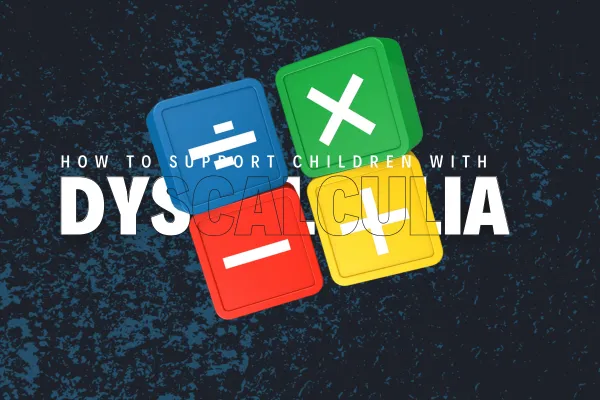
How to Support Children with Dyscalculia -- Unlocking Potential
How to Support Children with Dyscalculia --Unlocking Potential
Understanding dyscalculia is the first step toward unlocking a child's full potential in mathematics, an area where many face significant challenges. As we delve into the world of math learning disabilities, it's crucial to separate fact from fiction and dispel common dyscalculia myths that often cloud our understanding. Unlike dyslexia, which affects reading, dyscalculia specifically impacts a child's ability to grasp mathematical concepts, making everyday tasks daunting. For parents and educators determined to provide the best support, recognizing the signs and differences of dyscalculia vs. dyslexia is key. Join us as we explore practical strategies to support children, empowering them to overcome learning difficulties and thrive in their academic journey there in Lewisville, TX.
Understanding Dyscalculia
Understanding dyscalculia is crucial for parents, educators, and individuals struggling with math. This section explores the definition of dyscalculia, how it differs from dyslexia, and common myths surrounding this learning difficulty.
What is Dyscalculia?
Dyscalculia is a specific learning disability that affects a person's ability to understand and work with numbers. It's often referred to as "math dyslexia," but this term isn't entirely accurate.
People with dyscalculia may struggle with basic arithmetic, understanding number concepts, and performing mathematical calculations. This difficulty extends beyond just "being bad at math" – it's a neurological condition that impacts daily life in Frisco, TX.
Common signs of dyscalculia include:
Difficulty recognizing number patterns
Trouble with mental math and estimation
Challenges in understanding time and money concepts
Struggles with spatial awareness and directions
Dyscalculia vs. Dyslexia
To really understand dyscalculia and dyslexia you must realize they are learning
disabilities, they affect different areas of cognition. Understanding these differences is crucial for proper diagnosis and support.
Dyscalculia primarily impacts numerical and mathematical processing. Individuals with dyscalculia may struggle with basic arithmetic, understanding number concepts, and performing calculations.
Dyslexia, on the other hand, affects language processing, particularly reading and writing. People with dyslexia may have difficulty recognizing letters, reading written words, and expressing themselves in writing.
Individuals with dyslexia and dysgraphia both tend to struggle with learning basic math facts.

Dyscalculia Myths
There are several misconceptions about dyscalculia that can hinder proper understanding and support. Let's debunk some common myths:
Myth 1: Dyscalculia is just being "bad at math"
Reality: Dyscalculia is a specific learning disability, not a lack of effort or intelligence.
Myth 2: Dyscalculia only affects academic performance
Reality: It can impact daily life skills like managing time and money.
Myth 3: People with dyscalculia can't improve their math skills
Reality: With proper support and strategies, individuals with dyscalculia can make significant progress.
Understanding these myths is crucial for providing effective support and fostering a positive learning environment for those with dyscalculia in Frisco, TX.
Supporting Children with Dyscalculia
Supporting children with dyscalculia requires a collaborative effort between parents, educators, and the children themselves. This section explores strategies and techniques to help children overcome their math learning difficulties and build confidence in their abilities.
Strategies for Parents
Parents play a crucial role in supporting children with dyscalculia. By creating a positive learning environment at home and working closely with educators, parents can significantly impact their child's progress.
Encourage a growth mindset: Frisco parents, help your child understand that math skills can improve with practice and effort. Celebrate small victories and progress rather than focusing solely on grades.
Use real-life math applications: Incorporate math into daily activities like cooking, shopping, or playing games. This helps children see the practical relevance of math skills.
Provide visual and tactile learning aids: Use manipulatives, diagrams, and charts to make abstract concepts more concrete and easier to understand.
Remember, patience and consistency are key when supporting a child with dyscalculia. Celebrate their strengths in other areas while working on math skills.
Techniques for Educators
Educators play a vital role in supporting students with dyscalculia. By implementing targeted strategies and accommodations, teachers can help these students succeed in the classroom.
Multisensory teaching: Incorporate visual, auditory, and kinesthetic learning methods to cater to different learning styles. This might include using manipulatives, drawing diagrams, or creating math songs.
Break down complex problems: Teachers and parents in Lewisville, TX teach students to approach math problems step-by-step. Use checklists or visual guides to help them remember the process.
Provide extra time and support: Allow students with dyscalculia additional time for tests and assignments. Offer one-on-one support or small group instruction when possible.
Remember, each student with dyscalculia is unique. Tailor your approach to their individual needs and strengths.
Building a Supportive Environment
Creating a supportive environment is crucial for children with dyscalculia to thrive. This involves collaboration between parents, educators, and the wider community.
Open communication: Maintain regular dialogue between parents and teachers about the child's progress, challenges, and successes. This ensures consistent support across all environments.
Promote self-advocacy: Teach children to express their needs and ask for help when necessary. This skill will serve them well throughout their academic journey and beyond.
Celebrate diverse strengths: Recognize and nurture the child's talents in other areas, such as art, music, or sports. This helps build overall confidence and self-esteem.
By fostering a supportive, understanding environment, we can help children in the Frisco, Lewisville Texas area with dyscalculia overcome their challenges and reach their full potential.
"The most important thing is to never stop questioning." - Albert Einstein
This quote reminds us of the importance of curiosity and perseverance in learning, especially when facing challenges when learning to understand dyscalculia.
